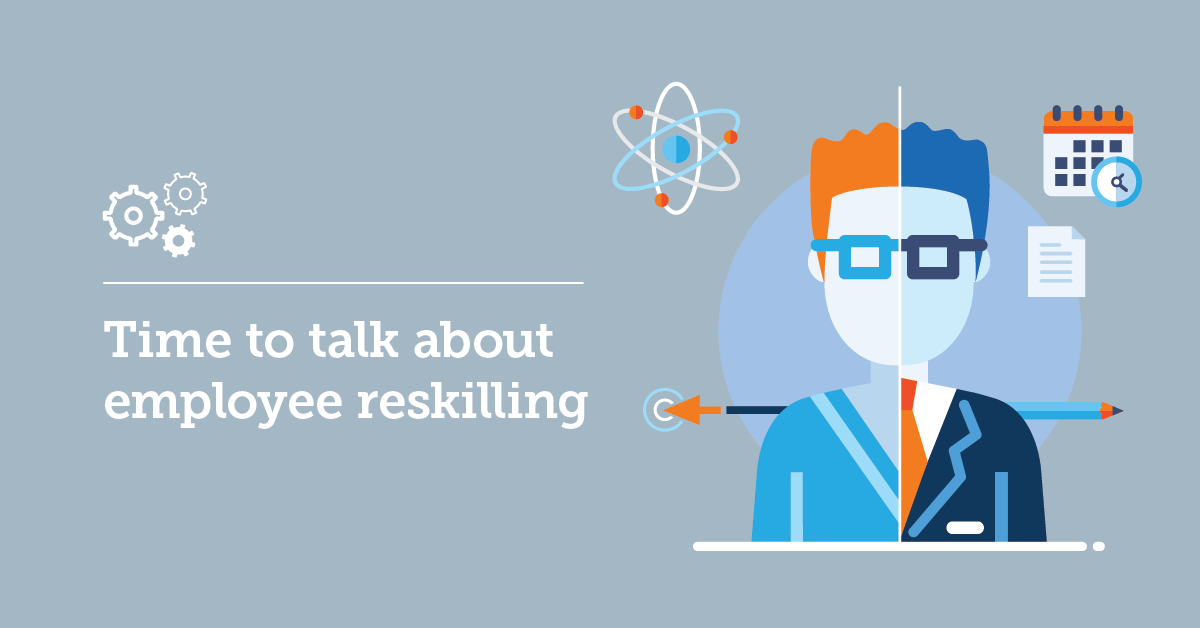![]()
Click here to view our 2024 Research on the State of Upskilling and Reskilling.
Plus, get 10 data-backed tactics to amp up your skilling initiatives, along with insights from 5 L&D experts.
![]()
In late 2019, the World Economic Forum issued an alert. Lack of skills was keeping CEOs awake at night. The only way to bridge the skills gap is through upskilling or reskilling programs.
As a result, we joined forces with hiring experts Workable and Training Journal, to shed light on the current state of reskilling and upskilling training.
Our key findings include:
- 42% of companies stepped up their upskilling/reskilling efforts after the coronavirus outbreak.
- 42% of employees have pursued training on their own after the coronavirus outbreak.
- 68% of companies invest in reskilling/upskilling training to handle changes within the organization and another 65% to train employees on new technologies.
- 50% of employers target both hard and soft skills through their upskilling/reskilling initiative.
- Companies believe that employees are lacking communication/collaboration, leadership, and proactive thinking skills.
- 91% of companies and 81% of employees say upskilling/reskilling training has boosted productivity at work.
- 62% of employees hoped that reskilling and upskilling training would positively affect their job level and/or salary. However, only 33% and 35%, respectively say there’s been a significant change in compensation and growth within the company.
- 74% of employees think their managers need reskilling and upskilling training.
- 66% of employees ranked the joy of learning new things and developing new skills as the top upskilling motivator.
- 80% of employees say that upskilling/reskilling training has boosted their confidence.

First, we asked companies whether they have ever provided their employees with reskilling or upskilling training. Luckily, 92% of respondents say they have.
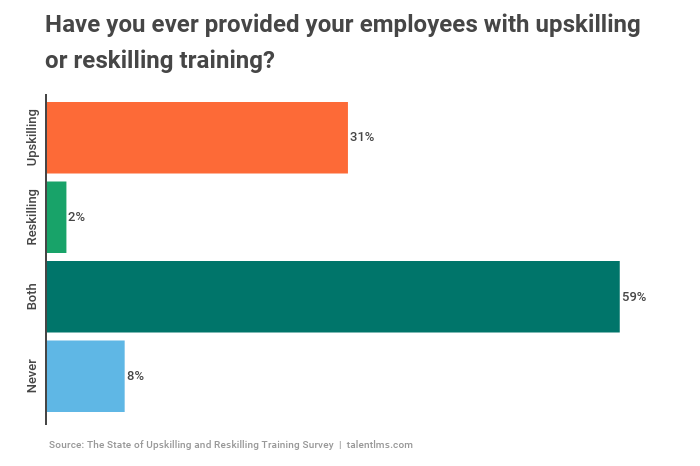
How we did it
TalentLMS, Training Journal, and Workable surveyed 282 training and hiring managers, C-level executives, and decision-makers in various companies to see why they decided to reskill or upskill their workforce and how beneficial it’s been to business. Then, we reached out to 400 full-time employees in the US between the ages of 18 and 54+ to ask them about their employers’ upskilling and reskilling training initiatives.
When we rolled out the survey, the coronavirus outbreak had already become part of the world’s everyday life. So, we had to address the situation.
Employee reskilling and upskilling training in the COVID-19 era

During lockdown, 43% of employers figured it was the perfect time to expand their teams’ skill sets with more courses and training material:
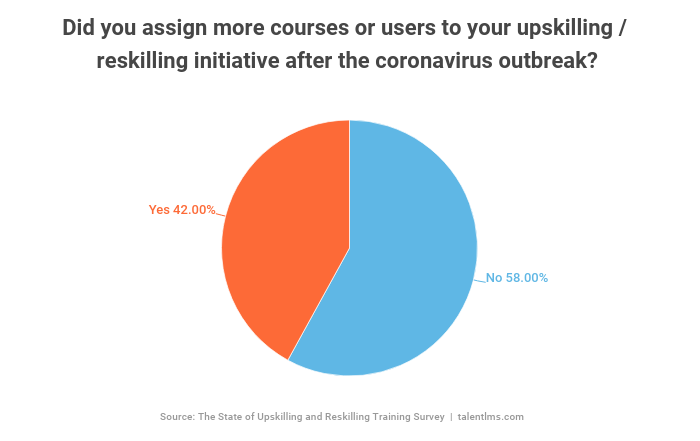
“In this collective time, companies across industries, no matter their size or needs, moved their training online to keep going. Not all companies indeed assigned more courses after the coronavirus outbreak, but they definitely will in the future since all their existing offline training is, for the most part, officially online. We’re entering a period where online training is not another solution but the only way to go. Employers like it, employees love it, and it gets you geared up for the unexpected. So what could go wrong?” says Eleftheria Papatheodorou, Customer Support and Training Director at TalentLMS.
But it wasn’t a one-way street. When we asked employees whether they pursued training in addition to what their employer had provided them since the coronavirus outbreak, 42% said yes.
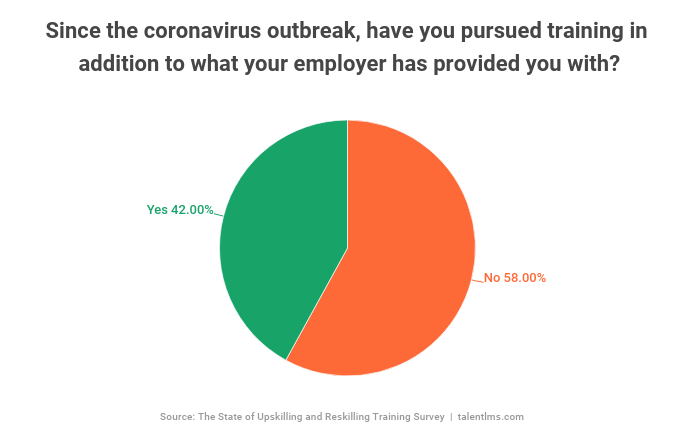
What’s interesting is that 27% of employees did not receive any upskilling/reskilling training from their employers. And from that group 65% sought out training on their own. The majority looked for online courses that would help them develop soft and hard skills related to their current role. In a time of uncertainty, 21% looked for upskilling courses that would help them get promoted.
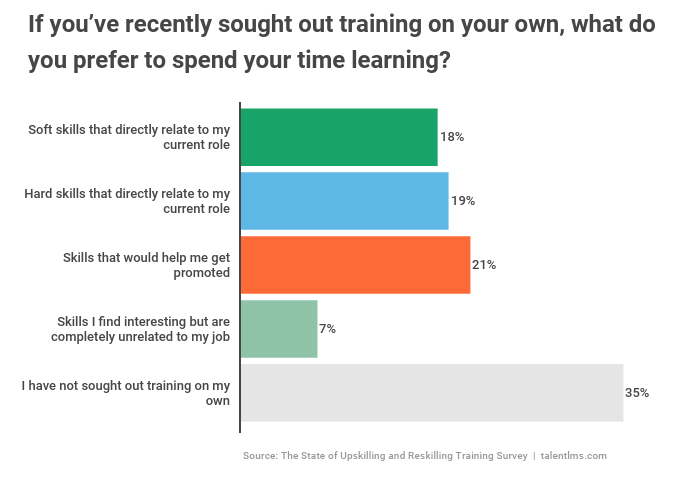
As you’ll notice, the need to advance or get a promotion came up often in the survey, and it is one of the top motivators for employees.
Upskilling and reskilling training: What do employers say?
We now know that 93% of employers offer upskilling, reskilling, or both. So, how do they do it?
Formal programs vs. Ad hoc
Although reskilling and upskilling training are considered important, only 35% of employers have an official upskilling/reskilling program in place with the majority (65%) delivering it on a case-by-case basis.
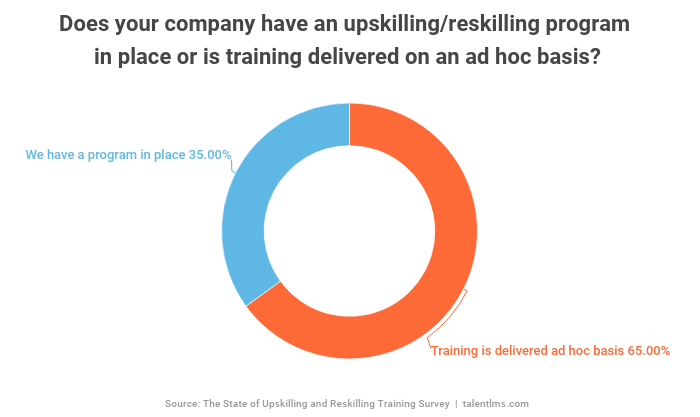
Training costs
About training costs, 33% of employers say their upskilling/reskilling training budget is part of their overall training costs while another 30% say that they don’t have a specific budget for upskilling or reskilling. Also, another 12% say they do have set a budget but it’s not enough.
Course creators
What we should keep in mind, though, is that the vast majority (87%) of the companies have in-house teams to design their training material for their upskilling and reskilling initiative. With the trend of employee reskilling and upskilling training gaining momentum, new roles in the corporate L&D industry might as well emerge.
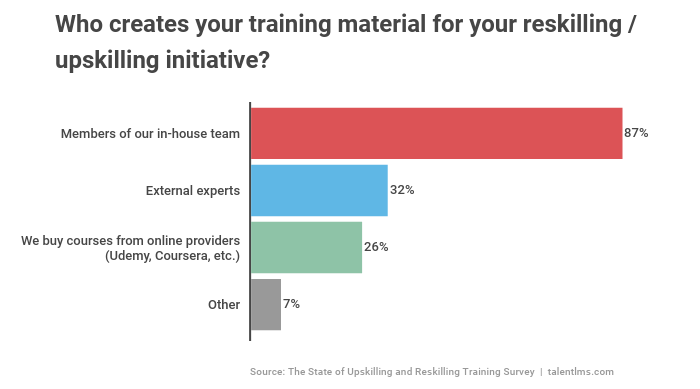
Training delivery
And as far as training delivery is concerned, blended learning is the most common delivery method with 69% of employers delivering reskilling and upskilling training both online and offline.
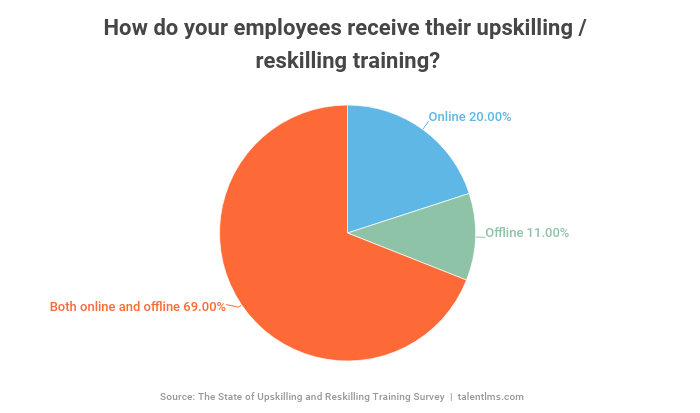
Lack of time and limited resources: The two main barriers
When employers were asked to pick the top three challenges they faced while developing their upskilling/reskilling initiative, more than half of them (55%) ranked “lack of time” first, and 46% also said that finding suitable training resources was a big concern.
What’s interesting though is that 19% faced resistance from upper management and another 18% had a hard time getting their employees to believe in the initiative.
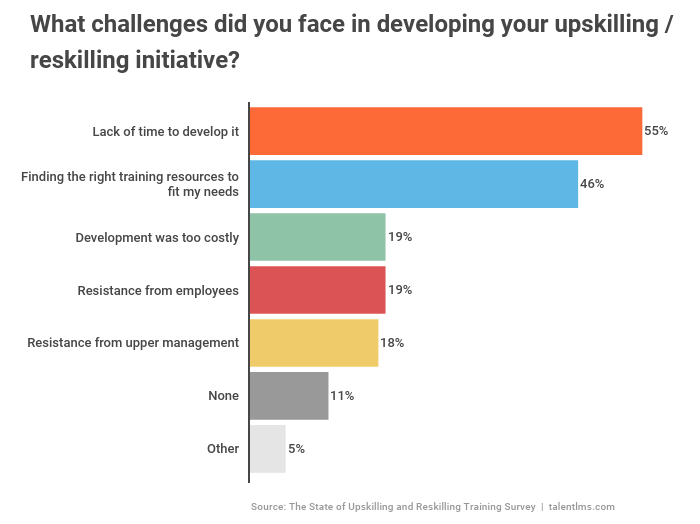
Employee upskilling & reskilling training: A matter of culture and skills development
We asked managers to pick the top reasons why they felt the need to upskill or reskill their workforce.
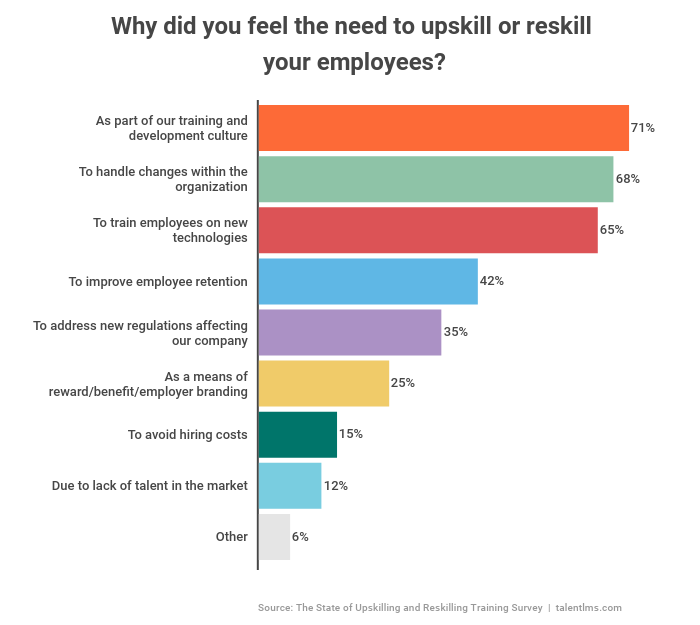
These responses suggest that employers see training as a benefit and an important factor that is advantageous to the overall company culture. But in addition to that, reasons that have to do mostly with skills development and changes within the organization (i.e., promotions), also play an important part. These skills can be either hard or soft.
In fact, 50% of employers target both hard and soft skills. Thirty percent train on soft skills exclusively, and the remaining 20% target hard skills.
Vertical mobility and the need for soft skills
Companies value not only hard skills, but also soft skills. We asked managers what skills they’re looking for when making hiring decisions. And the higher an employee climbs the corporate ladder, the more soft skills employers require.

Now that we know what companies expect from new hires, we need to see what soft skills they expect from their current workforce to develop. The graph below shows what skills employers believe that their teams are lacking.
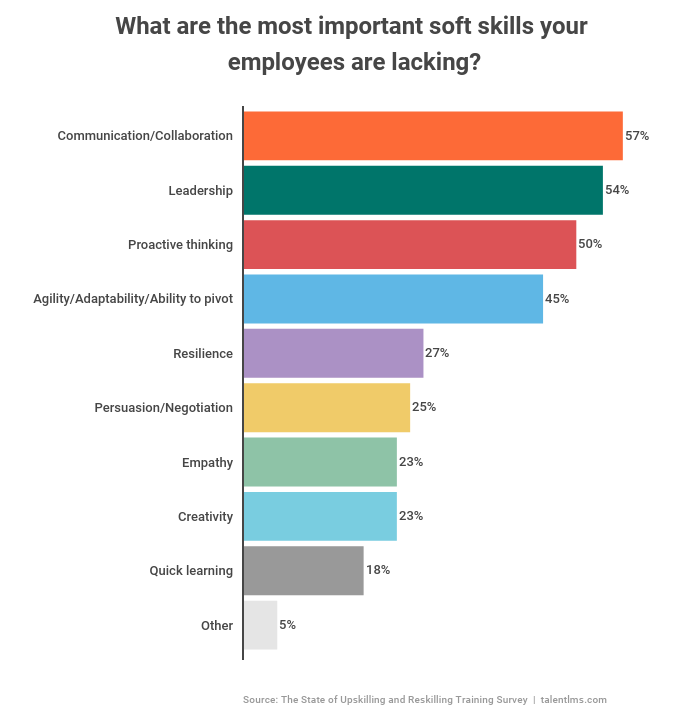
Workforce upskilling and reskilling training: Is it worth it?
All in all, an employee training program can only benefit companies. This is why the majority of employers say that upskilling and reskilling training has improved performance, employee retention, goals, and company reputation.
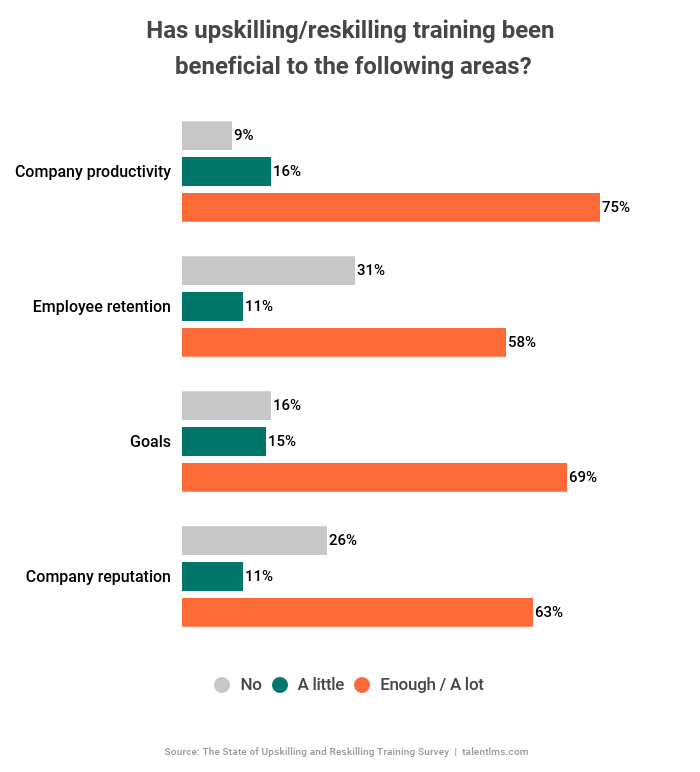
In an attempt to measure their employees’ satisfaction with training, 72% of companies say they ask their learners to evaluate their program, and 51% believe their employees like it. However, another 26% state that their employees would like their upskilling/reskilling training if they had the time to take it.
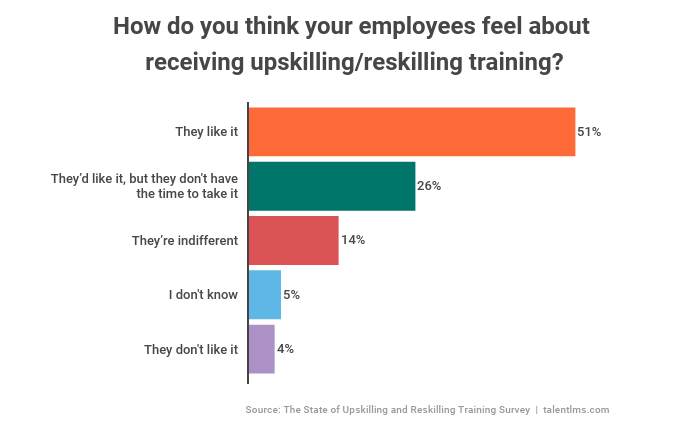
But what are employees saying? Let’s find out next.
![]()
Employee reskilling and upskilling training: Companies almost on the right track
In general, employers seem to be doing a good job since 78% of employees say they’re satisfied or very satisfied with their upskilling/reskilling training. At the same time, another 70% are satisfied with the amount of reskilling and upskilling training their employers provide them with.
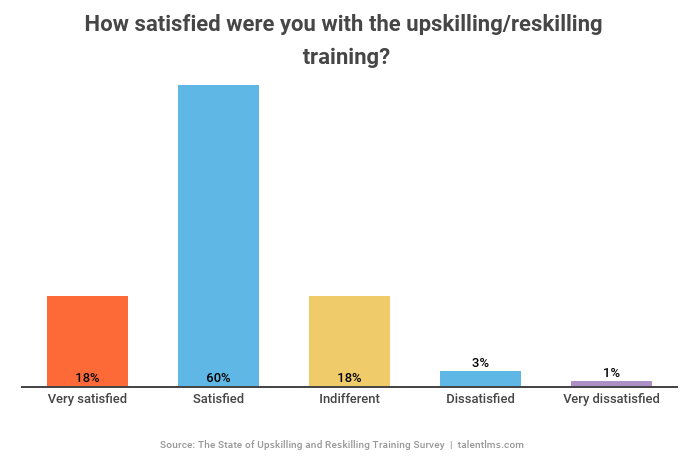
However, 27% of employees say their employer has provided neither upskilling nor reskilling training in the past 5 years of their careers. From those employees, 80% say they’ve never asked for any upskilling or reskilling, either.
“While it’s very encouraging to see that 92% of the companies surveyed are engaged in either upskilling or reskilling their workforce, when you couple that with the fact that 80% of employees have never asked for training, it’s clear that businesses need to do much more to empower their employees to learn. Some good signs, but more work to do,” says Jon Kennard, Digital Editor at Training Journal.
Clearly, businesses need to ask their employees whether they’d like more training opportunities, since 74% of those who haven’t received any upskilling/reskilling training would prefer to work for a company that offers upskilling or reskilling opportunities.
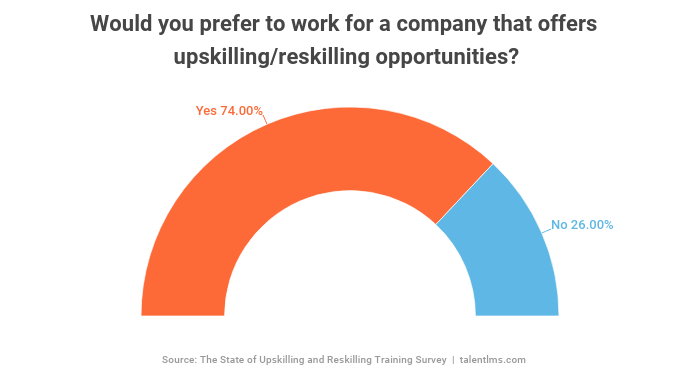
Also, employees seem to prefer online training against offline. 6 in 10 employees say they prefer to complete their training through online upskilling courses, webinars, virtual sessions, and other online training means.
Employee upskilling and reskilling: A matter of advancement
But in terms of the reasons why employees want to acquire new or additional skills, the most recurring answer was promotion and advancement within the company they work for.
We asked employees what type of skills would help them advance the most as professionals, and 66% chose “hard skills” against “soft skills.” At the same time:
- 66% say that the joy of learning new things and developing new skills is their top reason for upskilling
- 33% do it with the purpose to be promoted
- 29% invest time in upskilling because they want a raise
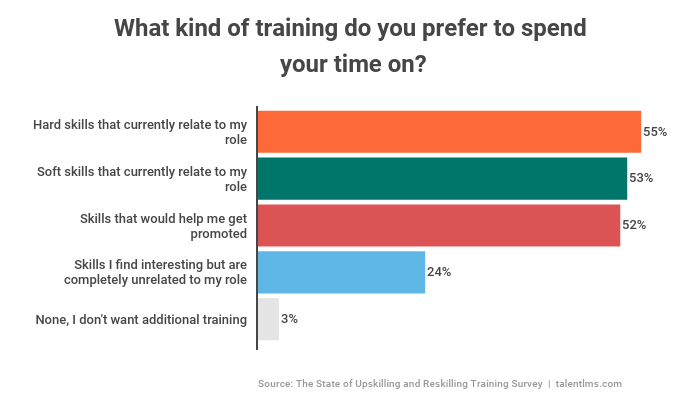
The graph above proves that employees see upskilling and reskilling training as a means of advancement.
But when we asked about the actual, tangible benefits that their upskilling/reskilling training has come with, only 33% say that they’ve noticed significant change in compensation and 35% experienced significant growth within their company.
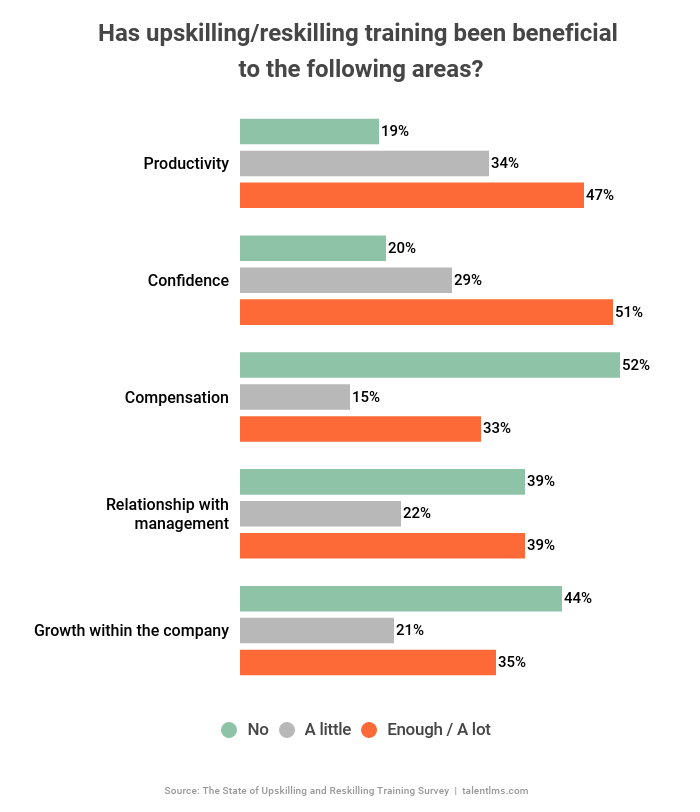
Skills gaps: Employees vs. employers
Previously, managers said that the top three soft skills employees are lacking are communication/collaboration, leadership, and proactive thinking. But what do employees think of their co-workers? Interestingly enough, they agree.
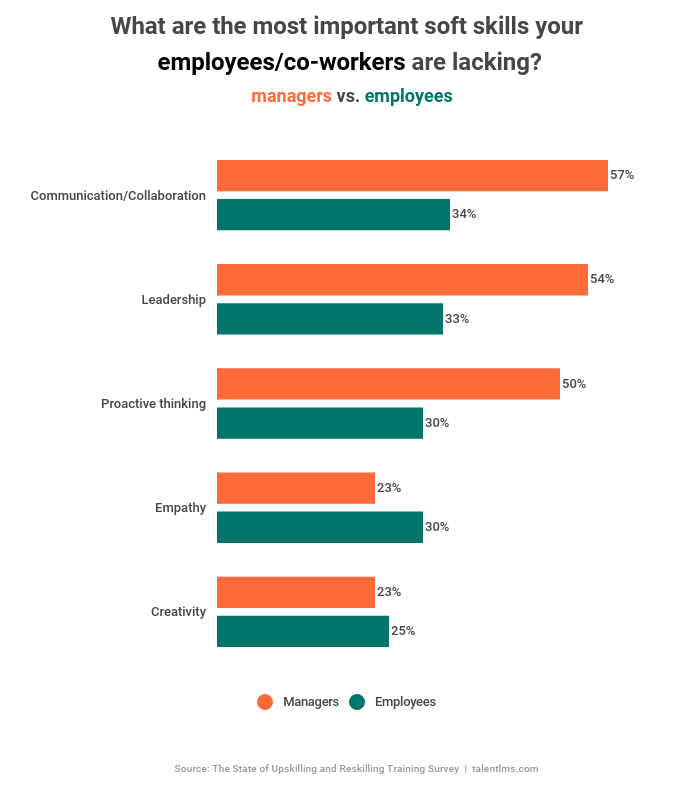
Apparently, managers might have missed empathy and creativity, which according to employees are two essential skills their co-workers are lacking.
Upskilling, however, can also be beneficial to managerial positions. When employees were asked about their managers’ skills, and if they would provide them with upskilling or reskilling training if they had the chance, this happened:
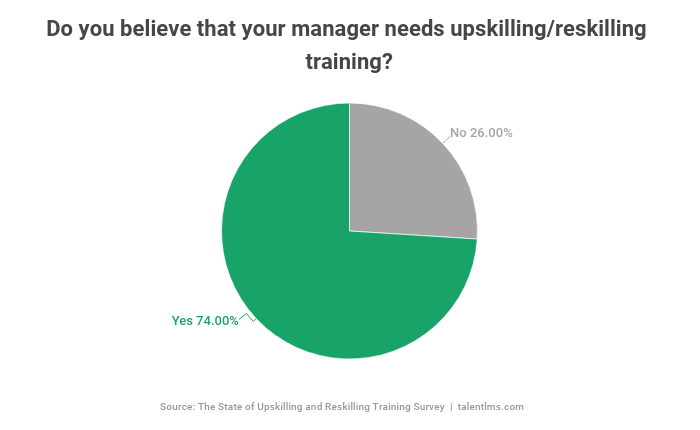
“When you find that 74% of employees think their managers need training, that indicates the need for upskilling and reskilling as part of a more holistic employee development strategy. When your employee base feels they’re growing in your company and that everyone is growing with them, that is one of the most powerful tools you can promote in your candidate attraction strategy,” Keith MacKenzie, Workable’s Content Strategy Manager, says.
Surprisingly, though, employees believe that the skills their co-workers are lacking are the skills they, themselves, excel in. Also, even though managers ranked leadership as the second most wanted skill their teams are missing, employees believe it’s the top skill they’ve already mastered.

These contradictions can only mean one thing. That companies need to identify skills their company is missing and measure skills gaps.
![]()
Food for thought: Upskilling, reskilling, and a generation gap
After we analyzed responses from employees, we noticed a pattern. That satisfaction, interest, and investment from companies in employee upskilling/reskilling training might depend on the employee’s age and career stage in life.
According to our findings:
- Upskilling and reskilling are highest among younger age groups and lower among older groups – which might mean that when it comes to this type of training companies might be willing to invest in younger generations.
- More young people (18-44) have pursued training in addition to what their employers have offered since the coronavirus outbreak.
- Employees between 18-24 are least satisfied with the amount of upskilling and reskilling training their employers offer.
- There is also a difference between the types of skills employees are looking to acquire. More specifically, those aged between 25-44 say that they prefer to spend time on hard skills while all other age groups prefer to spend more time on soft skills development.
Conclusion
With skills gaps threatening the business world, upskilling/reskilling training has become an essential stage in the employee training cycle. Today, in the middle of this once-in-a-lifetime crisis, both employers and employees have stepped up their efforts since the lockdown came with much more time in their hands.
However, while employers are looking to address missing skills to increase performance, employees are trying to use upskilling and reskilling training to grow within their company and achieve greater compensation. Although, according to companies, productivity and performance have increased due to reskilling/upskilling training, employee advancement rarely happens.
Last but not least, apart from the existing skills gaps, a gap between what employers and what employees think is also prominent. Managers believe employees lack skills that employees think they excel in, while 74% of employees say that their managers need upskilling/reskilling training. This finding suggests that it’s high time companies measured skills gaps, so they can have a complete overview of what skills they need to target.
In any case, we’ve officially entered the era of upskilling and reskilling. Employers think it can only be beneficial to business, while employees appreciate it so much that a company that offers reskilling and upskilling training will probably grab their attention.
| Tags: Employee Training



